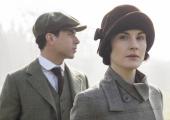Scott & Bailey, Series 4, ITV

Manchester's detective duo are as disaster-prone as ever
When Rachel Bailey (Suranne Jones) told the promotion board at the beginning of this series: “I’m not a liability, I’m a safe pair of hands”, we knew it would be a matter of sitting back and waiting to see in what manner she would heap disgrace upon herself.








